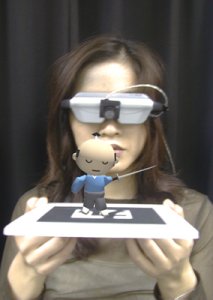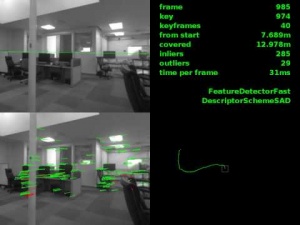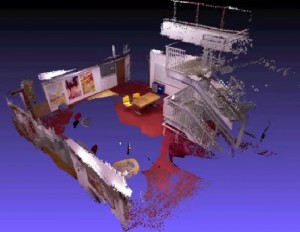|
|
| (15 intermediate revisions by 4 users not shown) |
| Line 1: |
Line 1: |
| − | Click [http://airlab.elet.polimi.it/index.php/airlab/research_areas/computer_vision_and_image_analysis here] for a brief description of the Research Area, taken from the AirLab website.
| + | Computer Vision research involves both feature extraction from two-dimensional images, and analysis and reconstruction of 3D scenes. |
| | | | |
| | + | == Ongoing Projects == |
| | + | {{#ask: [[Category:Project]][[prjResArea::{{PAGENAME}}]][[PrjEnd::>{{CURRENTYEAR}}/{{CURRENTMONTH}}/{{CURRENTDAY}}]]|?prjTitle = |format=ul}} |
| | | | |
| − | If you are looking for a list of the computer vision gear that you can find in the AIRLab, please look here: [[Cameras%2C_Lenses_%26_Mirrors]]. If you are looking for a list of the other gear that you can find in the AIRLab, please look here: [[Robotics]]. | + | == Project Proposals == |
| | + | {{#ask: [[Category:ProjectProposal]] [[PrjStatus::Active]] |
| | + | [[PrjResArea::{{PAGENAME}}]]| |
| | + | ?PrjTitle | |
| | + | ?PrjImage | |
| | + | ?PrjDescription | |
| | + | ?PrjTutor | |
| | + | ?PrjStarts | |
| | + | ?PrjStudMin | |
| | + | ?PrjStudMax | |
| | + | ?PrjCFUMin | |
| | + | ?PrjCFUMax | |
| | + | ?PrjResArea | |
| | + | ?PrjResTopic | |
| | + | ?PrjLevel | |
| | + | ?PrjType | |
| | + | format = template | |
| | + | template = Template:ProjectProposalVizSlim |
| | + | }} |
| | + | |
| | + | == People == |
| | + | |
| | + | {{#ask: [[HasResArea::{{PAGENAME}}]] [[UserStatus::active]]| format=ul}} |
| | + | |
| | + | ==Past Projects== |
| | + | |
| | + | {{#ask: [[Category:Project]][[prjResArea::{{PAGENAME}}]][[PrjEnd::<{{CURRENTYEAR}}/{{CURRENTMONTH}}/{{CURRENTDAY}}]] |format=ul}} |
| | + | |
| | + | ==Hardware== |
| | + | If you are looking for a list of the computer vision gear that you can find in the AIRLab, please look here: [[Cameras, lenses and mirrors]]. If you want a list of ''all'' the gear that you can find in the AIRLab, [[What's in the AIRLab]] is the right page. |
| | + | |
| | + | |
| | + | [[Category:Research Area]] |
Latest revision as of 13:03, 31 December 2012
Computer Vision research involves both feature extraction from two-dimensional images, and analysis and reconstruction of 3D scenes.
Ongoing Projects
Project Proposals
Wiki Page: Accurate AR Marker Location
Title: C++ Library for accurate marker location based on subsequent pnp refinements
Description: ARTags, QR codes, Data Matrix, are visual landmark used for augmented reality, but they could be used for robotics as well. A thesis has already been done on using data matrix for robot localization and mapping, but improvements are required in terms generality, accuracy and robustness of the solution. The goal is thuss to:
- increase the number of markers supported by the system (ARTag + QR codes)
- increase the accuracy of the detection and localization of the marker
- test different algorithms for the solution of the perspective from n points problem
Material:
- papers on PnP algorithms, OpenCV,
- Matlab code with three PnP algorithms implementations
- C++ libraries for marker detection (to be found and evaluated)
Expected outcome:
- C++ library to the robust localization of artificial markers
- a ROS node performing accurate ARTag localization
- a comparison of Tags and algorithms in a real world scenario
- The use of this library in a SLAM framework (Thesis)
Required skills or skills to be acquired:
- background on computer vision and image processing
- C++ programming under Linux
Tutor: MatteoMatteucci
Additional Info: CFU 5 - 10 / Bachelor of Science, Master of Science / Thesis, Course
|
Wiki Page: Comparison of State of the Art Visual Odometry Systems
Title: A Comparison of State of the Art Visual Odometry Systems (Monocular and Stereo)
Description: Visual odometry is the estimation of camera(s) movement from a sequence of images. In case we deal with a single camera system we have Monocular Visual Odometry; in case we have more cameras we have a Stero Visual Odometry. The goal of the thesis is to review the state of the art on in visual odometry, classify existing approaches and compare their implementations (many of the algorithms have online source code available).
Material
Expected outcome:
- a set of running algorithms performing visual odometry
Required skills or skills to be acquired:
- computer vision and 3D reconstruction
- C++ programming under Linux
Tutor: MatteoMatteucci
Additional Info: CFU 10 - 20 / Bachelor of Science, Master of Science / Thesis, Course
|
Wiki Page: Poit cloud SLAM with Microsoft Kinect
Title: Point cloud SLAM with Microsoft Kinect
Description: Simultaneous Localization and Mapping (SLAM) is one of the basic functionalities required from an autonomous robot. In the past we have developed a framework for building SLAM algorithm based on the use of the Extended Kalman Filter and vision sensors. A recently available vision sensor which has tremendous potential for autonomous robots is the Microsoft Kinect RGB-D sensor. The thesis aims at the integration of the Kinect sensor in the framework developed for the development of a point cloud base system for SLAM.
Material:
- Kinect sensor and libraries
- A framework for multisensor SLAM
- PCL2.0 library for dealing with point clouds
Expected outcome:
- Algorithm able to build 3D point cloud representation of the observed scene
- Point clouds processing could be used to improve the accuracy of the filter as well
Required skills or skills to be acquired:
- Basic background in computer vision
- Basic background in Kalman filtering
- C++ programming under Linux
Tutor: MatteoMatteucci
Additional Info: CFU 10 - 20 / Master of Science / Thesis
|
People
Past Projects
Hardware
If you are looking for a list of the computer vision gear that you can find in the AIRLab, please look here: Cameras, lenses and mirrors. If you want a list of all the gear that you can find in the AIRLab, What's in the AIRLab is the right page.


